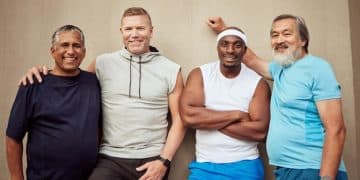Decoding diet culture: Lies that undermine body confidence

Advertisements
Decoding diet culture is essential to uncover the harmful myths that shape how we view food, health, and our bodies.
This deeply ingrained system often erodes self-worth, encourages restrictive behaviors, and promotes unrealistic ideals that leave many people feeling inadequate.
Advertisements
If you have ever struggled with the pressure to look a certain way or questioned whether your body is “good enough,” you have felt the weight of diet culture.
By decoding diet culture, we begin to challenge these falsehoods, dismantle their influence, and build a more compassionate relationship with ourselves.
Understanding the lies behind this system is the first step toward true body confidence and freedom from toxic standards.
The myth of the ‘ideal’ body: One size fits all
For decades, diet culture has relentlessly promoted a singular, often unrealistic, ideal of beauty: thinness.
This pervasive narrative suggests that a specific body size or shape is inherently healthier, more attractive, and more desirable.
This notion is not only scientifically inaccurate but also profoundly damaging, contributing to widespread body dissatisfaction and endless cycles of dieting.
The concept of an “ideal” body actively ignores the vast biological diversity among humans.
Just as we have varying heights, shoe sizes, and genetic predispositions, our bodies naturally settle into a wide range of weights and shapes.
This natural variability, often referred to as set point theory, suggests that each individual has a unique weight range that their body naturally strives to maintain, making sustained departures from this range incredibly difficult and potentially detrimental to health.
Challenging the homogenized beauty standard
One of the most persistent lies propagated by diet culture is the notion that thinness is universally achievable and synonymous with health.
This singular focus on weight often overlooks genuine indicators of well-being, such as nutritional intake, physical activity, mental health, and social connections.
A person’s weight alone tells us very little about their overall health status.
For instance, someone living in a larger body could be more metabolically healthy and physically active than someone in a smaller body who leads a sedentary lifestyle and consumes a nutrient-poor diet.
- Genetic predisposition: Our genes play a significant role in determining our body shape, size, and metabolic rate. Trying to override this genetic blueprint through restrictive dieting often leads to frustrating and unsustainable results.
- Biological diversity: Human bodies are incredibly diverse. Valuing this natural variation allows for a more inclusive and realistic understanding of what “health” can look like across the spectrum of human existence.
- Health at every size (HAES): The HAES paradigm advocates for health promotion regardless of size, focusing on sustainable healthy behaviors rather than weight loss, thereby encouraging body respect and rejecting weight stigma.
The societal pressure to conform to a narrow aesthetic ideal often pushes individuals toward extreme and unhealthy behaviors.
This can manifest as chronic dieting, obsessive exercise, and a constant feeling of failure when the “ideal” is not attained.
The mental and emotional toll of this relentless pursuit is significant, leading to increased anxiety, depression, and eating disorders.
It also fosters a culture of comparison and judgment, where self-worth becomes tied to external appearance rather than internal qualities.
Embracing the rich tapestry of human body shapes and sizes is fundamental to building genuine body confidence.
When we dismantle the myth of the ‘ideal’ body, we free ourselves from a cycle of shame and self-criticism, allowing us to appreciate our bodies for their functionality and uniqueness rather than their adherence to an arbitrary standard.
This shift in perspective is crucial for fostering a compassionate self-relationship.
Deception of dieting for long-term weight loss
Diet culture thrives on the promise of quick fixes and guaranteed weight loss, often marketing restrictive eating plans as the ultimate solution to body dissatisfaction.
However, the scientific evidence overwhelmingly suggests that diets, especially those that are highly restrictive, are largely ineffective for long-term weight loss and can even be counterproductive, leading to weight cycling, metabolic adaptation, and increased preoccupation with food.
The appeal of dieting is strong: it offers a clear path, an undeniable goal, and the illusion of control over one’s body.
Yet, the vast majority of dieters regain any lost weight, and often more, within a few years.
This phenomenon is not a failure of individual willpower, but rather a testament to the biological and psychological resilience of the human body, which is designed to resist starvation.
Why diets fail (and your body doesn’t)
When you significantly cut calories, your body responds by slowing its metabolism, increasing hunger hormones, and storing more fat as a protective mechanism against perceived famine.
This physiological response makes sustained weight loss extremely challenging and creates a continuous uphill battle against one’s own biology.
The constant emphasis on dieting perpetuates a narrative that weight is entirely within an individual’s control, ignoring complex biological, environmental, and social factors.
- Metabolic adaptation: Your metabolism slows down when you restrict calories, meaning your body burns fewer calories at rest. This makes it harder to lose weight and easier to regain it once you stop dieting.
- Hormonal changes: Restrictive eating can alter hunger and satiety hormones like leptin and ghrelin, leading to increased cravings and a constant feeling of deprivation, making it difficult to maintain a calorie deficit.
- Psychological impact: The constant focus on food rules, counting calories, and feeling deprived can lead to disordered eating patterns, obsessive thoughts about food, and a strained relationship with eating.
Moreover, the cycle of dieting and regaining weight, often referred to as “yo-yo dieting,” can have significant negative health consequences independent of overall weight.
This includes increased risk of cardiovascular disease, higher inflammation markers, and increased psychological distress.
The mental burden of chronic dieting, including feelings of failure, guilt, and shame when the diet inevitably “breaks,” can severely erode body confidence and self-esteem.
Understanding that diets are often set up for failure shifts the blame from the individual to the problematic nature of diet culture itself.
Instead of pursuing unsustainable weight loss, a more beneficial approach involves cultivating sustainable lifestyle habits such as mindful eating, regular enjoyable movement, and focusing on overall well-being.
This perspective liberates individuals from the constant pursuit of an elusive number on a scale, allowing them to focus on genuine health and self-care.

Food as ‘good’ or ‘bad’: The moralization of eating
Diet culture often categorizes foods as “good” or “bad,” assigning moral value to what we eat.
This black-and-white thinking creates a fear-based relationship with food, leading to guilt and shame when “bad” foods are consumed and a false sense of virtue when “good” foods are chosen.
This moralization of eating distorts our natural hunger and satiety cues and fosters a cycle of restriction and bingeing.
This prescriptive approach ignores the nuanced role food plays in our lives, beyond mere nutrition, food is also about pleasure, culture, social connection, and comfort.
When certain foods are demonized, it can lead to psychological distress, making eating a source of anxiety rather than enjoyment.
It also trivializes the complex process of nourishment, reducing it to a set of rigid rules.
Breaking free from the food police
The concept of “clean eating,” while seemingly benign, is an offshoot of this moralization, leading many to restrict entire food groups, develop orthorexic tendencies (an unhealthy obsession with healthy eating), and feel constant guilt over perceived transgressions.
This mindset breeds an internalized “food police” that constantly judges food choices, hindering intuitive eating and genuine enjoyment of food.
- Intuitive eating principles: This framework encourages listening to your body’s internal cues of hunger and fullness, respecting your body, making peace with food, and challenging the food police by allowing all foods to fit within a balanced diet.
- Food neutrality: Adopting a food neutral stance removes the moral weight from food choices. All foods can fit into a balanced diet, and no single food inherently makes you “good” or “bad.”
- Psychological freedom: When food is no longer seen as a test of self-control or moral righteousness, the anxiety around eating diminishes, and a more joyful, relaxed relationship with food can emerge.
The constant labeling of foods also creates a cycle of deprivation and subsequent overeating. When a “bad” food is forbidden, it often becomes more desirable.
Once consumed, the individual is likely to feel immense guilt, leading to a “what the hell” effect, where they continue to eat the forbidden food because they have already “failed.”
This cycle is emotionally draining and undermines physical health by promoting erratic eating patterns.
Rather than categorizing foods, a more beneficial approach focuses on overall dietary patterns, variety, and the pleasure of eating.
Understanding that all foods can contribute to a healthy life in moderation, and that no single meal or food choice dictates one’s health or worth, is crucial for developing a balanced and sustainable relationship with eating.
This shift from judgment to nourishment not only improves one’s relationship with food but also significantly boosts body confidence.

Exercise as punishment: The fitness trap
Diet culture often frames exercise not as a joyful celebration of movement or a means for physical and mental well-being, but as a punitive tool to burn calories, compensate for “bad” eating, or achieve a desired body shape.
This “exercise for punishment” mindset turns physical activity into a chore driven by guilt and obligation rather than intrinsic motivation, frequently leading to burnout, injury, or resentment towards movement.
When exercise is seen primarily as a means to an end, weight loss or body shaping, it loses its inherent value as a source of energy, stress relief, and improved mood.
This instrumental view of physical activity can make it unsustainable in the long run, as motivation wanes once the immediate aesthetic goal is not met, or when the activity itself becomes unpleasant.
Rediscovering the joy of movement
Many individuals find themselves trapped in a cycle where intense, joyless workouts are viewed as penance for eating.
This approach fails to recognize the diverse forms of movement that can contribute to health and vastly different ways bodies enjoy moving.
It dismisses the multitude of non-weight-related benefits of activity, such as improved cardiovascular health, increased strength, enhanced mood, better sleep, and reduced stress.
- Intrinsic motivation: Shifting focus from external outcomes (like weight loss) to internal drivers (like feeling energized, reducing stress, or enjoying the activity) makes exercise more sustainable and pleasurable.
- Diverse forms of movement: Recognizing that movement encompasses everything from dancing and hiking to gardening and swimming broadens the definition of “exercise” and makes it more accessible and enjoyable for everyone.
- Respecting your body’s needs: Understanding that rest, recovery, and listening to your body’s cues are as important as intense workouts prevents burnout and fosters a more balanced approach to physical activity.
The pressure to engage in high-intensity, rigid workout routines often leads to shame and feelings of inadequacy for those who cannot or choose not to meet these demanding standards.
This can cause individuals to avoid movement altogether, exacerbating the problem.
Furthermore, it reinforces the dangerous idea that physical worth is tied to workout intensity or visible muscle definition, undermining genuine body confidence.
To foster a healthier relationship with movement and enhance body confidence, it’s essential to disentangle exercise from its punitive associations.
This involves exploring forms of physical activity that bring joy, satisfaction, and a sense of vitality, rather than those driven by external pressures or guilt.
When movement becomes a source of pleasure and well-being, it naturally becomes a sustainable and positive part of life, reinforcing a loving and respectful relationship with one’s body.
Self-worth tied to size: The ultimate confidence killer
Perhaps the most insidious lie perpetuated by diet culture is the notion that an individual’s worth, success, happiness, and even moral standing are intrinsically linked to their body size or weight.
This belief system is deeply embedded in society, leading many to believe that becoming thinner will unlock a better life, more opportunities, and greater self-acceptance.
This equates physical appearance with personal value, which is a profound and damaging falsehood.
This pervasive message tells people that if they are not the “right” size, they are not good enough, worthy enough, or deserving of happiness.
This external validation through size creates a dangerous dependency, where one’s self-esteem rises and falls with the number on the scale or the fit of their clothes.
It blinds individuals to their true qualities, talents, and contributions, reducing an entire person to their physical form.
Reclaiming your intrinsic value
The constant pursuit of weight loss to achieve worth is a never-ending cycle, as the goalposts constantly shift, and true self-acceptance cannot be found through external measures.
This lie can lead to a lifetime of body dissatisfaction, no matter what size one achieves, because the underlying belief that worth comes from external factors remains unchallenged.
This also fuels comparison with others, creating a competitive and judgmental environment.
- Unconditional self-acceptance: Recognizing that your worth is inherent and not dependent on your appearance, achievements, or what others think of you.
- Focus on inner qualities: Shifting attention to internal attributes such as kindness, intelligence, creativity, empathy, and resilience, which are true indicators of character and personal value.
- Challenging societal messages: Actively questioning and rejecting media, advertising, and cultural narratives that link thinness to success and happiness, and beauty to worth.
The societal glorification of thinness and the stigmatization of larger bodies creates an environment where weight-based discrimination is rampant, affecting employment, healthcare, and social interactions.
This further reinforces the idea that size dictates one’s value and treatment in the world, compounding feelings of shame and otherness.
The emotional toll of constantly feeling “less than” can lead to significant mental health challenges, including chronic low self-esteem and body dysmorphia.
Dismantling the lie that self-worth is tied to size is paramount for cultivating genuine body confidence. It involves a fundamental shift from external validation to internal self-acceptance.
Recognizing that every body is worthy of respect, care, and love, regardless of its shape or size, is the cornerstone of true body positivity.
When we detach our value from our appearance, we free ourselves to pursue a life rich in meaning, purpose, and authentic happiness, fostering a deeper, more resilient sense of self-worth that is independent of fleeting beauty standards.
| Key Principle | Brief Description |
|---|---|
| ⚖️ Embrace Body Diversity | Rejecting the one-size-fits-all beauty ideal and celebrating natural body variations. |
| 🌱 Holistic Health Focus | Prioritizing well-being through sustainable habits, not just weight loss metrics. |
| 🍎 Food Neutrality | Removing moral labels from food, fostering a balanced and guilt-free relationship. |
| 💖 Inherent Worth | Understanding that self-worth is inherent, independent of body size or appearance. |
Frequently Asked Questions (FAQ) about Diet Culture
Diet culture is a pervasive societal system that worships thinness, equates it to health and moral superiority, and promotes weight loss as the primary means of achieving well-being. It often shames larger bodies and demonizes certain foods, influencing everything from advertising to medical advice.
Recognizing these lies empowers you to challenge deep-seated beliefs that undermine self-worth. By understanding that diet culture’s promises are often false, you can detach your sense of value from external body standards and cultivate an authentic, compassionate relationship with your body.
Yes, the Health at Every Size (HAES) approach posits that health behaviors, not weight, are the key determinants of well-being. Individuals of various sizes can engage in health-promoting behaviors like nutritious eating, joyful movement, and stress management, leading to improved health outcomes irrespective of their weight. It emphasizes body respect and challenges weight stigma.
Begin by unfollowing accounts promoting restrictive diets on social media and seeking out diverse body positive content. Practice mindful eating, focusing on internal hunger/fullness cues. Engage in joyful movement rather than exercise as punishment, and challenge negative self-talk about your body. Seek information from non-diet health professionals if possible.
Absolutely not. Rejecting diet culture means redefining health to be comprehensive and inclusive, moving beyond a sole focus on weight. It encourages sustainable, compassionate habits that support physical and mental well-being for all bodies, emphasizing intuitive self-care and body respect rather than external rules or aesthetic ideals.





